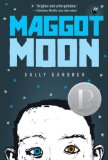Book Club Discussion Questions
Want to participate in our book club? Join BookBrowse and get free books to discuss!
Please be aware that this discussion guide will contain spoilers!
- At the beginning of the novel, Standish observes that "what ifs are as boundless as the stars" (p. 1). What is the historical "what if" that puts the plot of Maggot Moon into motion? When is this novel set? Where is it set?
- "There are train-track thinkers," says Hector, "then there's you, Standish, a breeze in the park of imagination" (p. 4). What does Hector mean? What are the advantages of being a train-track thinker? What are the risks of thinking differently
- "Gramps was the only person that still pulled at the gravity in me," says Standish (p. 23). Why is this such an apt description of their relationship?
- Standish is an awful reader, an even worse writer, and an all-around terrible student. Why are these advantages for him, not disadvantages?
- Death and disappearance are common events in Zone Seven. How do most of its inhabitants respond to their losses? How do Gramps and Standish respond to theirs?
- The Motherland's moon project is an audacious and expensive hoax. Who are the leaders trying to fool? Why? Without Standish's intervention, do you think they could have succeeded?
- Why was the moon man silenced by government agents? How and why was Standish's mother punished? What other means does the Motherland use to silence dissent? How does it reward compliance?
- Standish seems to travel freely between reality and fantasy. At what points in the story did you realize that what you thought was imagined was actually true? In what other ways does the novel continually keep readers off balance?
- How did Standish and Hector discover the planet Juniper? Who inhabits it? Do you know any Juniparians? Are you one?
- Who are the leather-coat men and the Greenflies? Where do they get their authority? What have they given up for that power?
- "Terror is an odd thing," says Standish. "It has made me panic, it had made me spew, but this time, I felt a calm fury" (p. 170). How do you explain Standish's reaction to the armed intruder in his home? How would you react?
- Although he can't recall how he learned the story and doesn't know the names of its characters, Standish knows the biblical tale of David and Goliath. What is the point of that ancient story? Why is Standish modeling himself after David?
- Gramps sometimes wonders if "there is any such thing as a truth. Hard to tell when so much is a lie" (p. 167). In a land full of lies, how do you recognize truth? Why must you try?
- How does Hector save Standish's life? How does he also put it at risk? How much is each willing to sacrifice for the other?
- "I believe the best thing we have is our imagination," Hector says to Standish (p. 142). Do you agree? Why or why not?
- Reunited with his wounded friend, Hector, Standish wonders why mankind is so cruel. How would you respond to his question?
- Two stories unfold in this book. One is told in words and the other in pictures. Why do you think the book ends with a drawing? What does it mean? What do you believe happens to Standish?
Unless otherwise stated, this discussion guide is reprinted with the permission of Candlewick Press.
Any page references refer to a USA edition of the book, usually the trade paperback version, and may vary in other editions.




